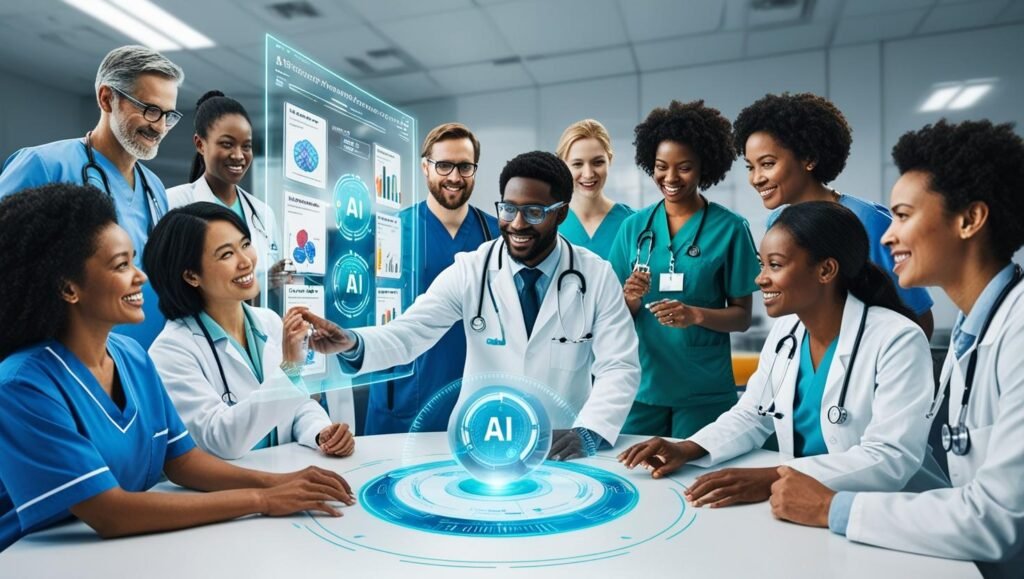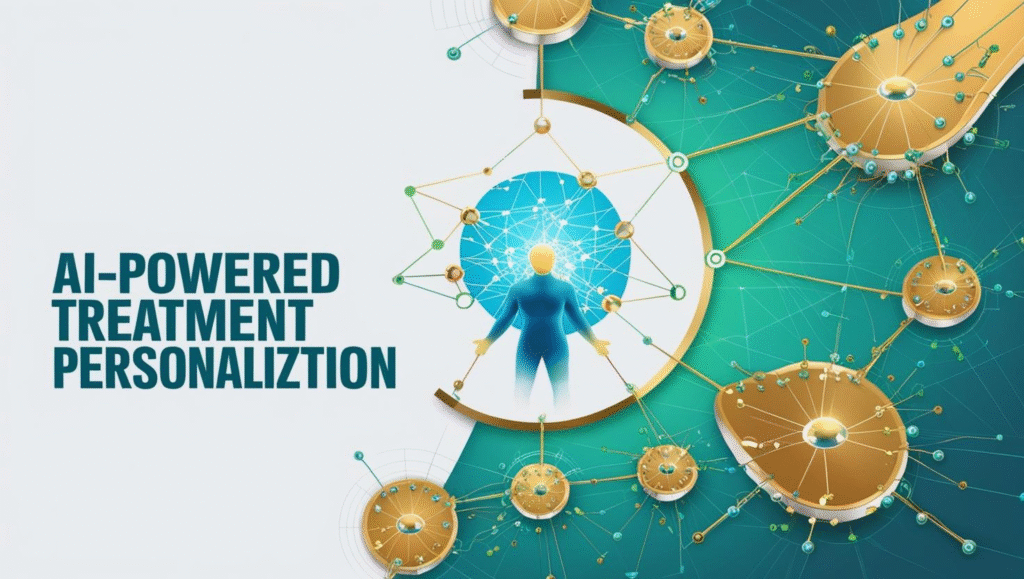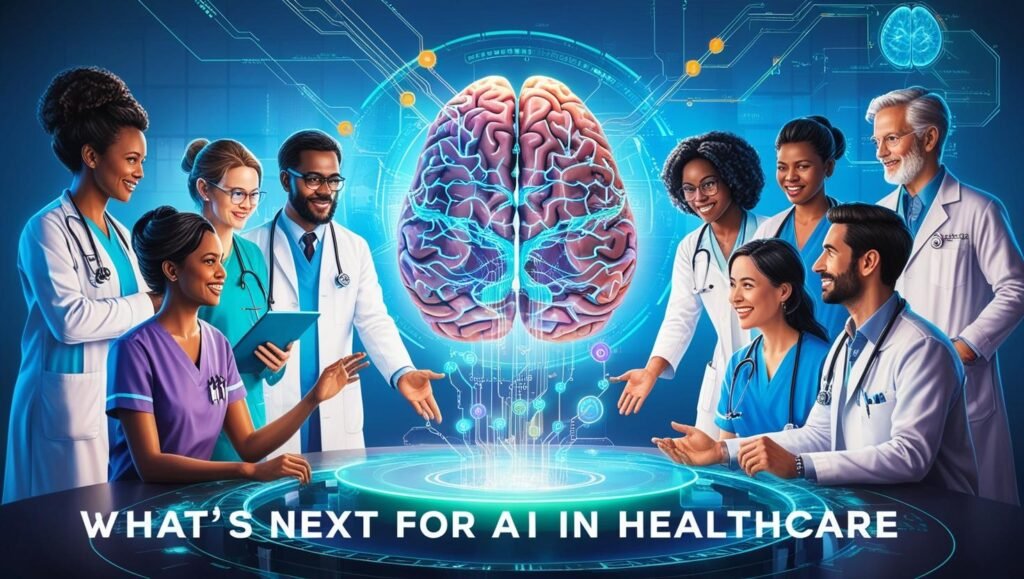AI + Healthcare: What’s Changing?

AI in healthcare is reshaping the landscape of medicine in ways that were once confined to science fiction. The convergence of artificial intelligence and healthcare is enhancing diagnostic accuracy, streamlining operations, and personalizing patient care as algorithms and machine learning models continue to evolve.
From predictive analytics that identify potential health risks to AI-driven tools that assist in complex surgical procedures, this technology is transforming the way healthcare professionals interact with data and patients alike. Encountering AI in healthcare isn’t just a trend; it’s a paradigm shift that promises to improve outcomes and increase efficiency.
Join us as we explore the profound changes happening at the intersection of AI and healthcare, uncovering what these advancements mean for patients, providers, and the future of medical practice.
The Role of AI in Diagnostics
Artificial Intelligence (AI) is revolutionizing the field of diagnostics, offering tools that significantly enhance the accuracy and speed of disease detection. By leveraging machine learning algorithms, AI can analyze vast amounts of medical data, including patient records, lab results, and imaging studies, to identify patterns and anomalies that may be indicative of specific health conditions.
This capability allows for earlier detection of diseases such as cancer, diabetes, and cardiovascular disorders, which is crucial for effective treatment and improved patient outcomes.
One of the most significant contributions of AI in diagnostics is its ability to process and interpret complex medical imaging. Traditional methods often rely on the expertise of radiologists, who manually review images for signs of disease.
However, AI-powered systems can rapidly analyze these images with a high degree of accuracy, highlighting areas of concern and providing a second opinion that can aid in diagnosis.
For instance, AI algorithms have been developed to detect tumors in mammograms, identify lung abnormalities in chest X-rays, and assess retinal images for signs of diabetic retinopathy.
Moreover, AI is enhancing diagnostic capabilities through predictive analytics, which can anticipate potential health issues before they become symptomatic. By analyzing historical patient data, AI systems can identify risk factors and predict the likelihood of developing certain conditions.
This proactive approach enables healthcare providers to implement preventive measures and monitor patients more closely, ultimately reducing the incidence and severity of diseases. The integration of AI in diagnostics is proving to be a game-changer, offering unprecedented precision and efficiency in identifying and managing health conditions.
AI-Powered Treatment Personalization

The advent of AI in healthcare is paving the way for personalized treatment plans that cater to the unique needs of each patient. Traditional treatment protocols often follow a one-size-fits-all approach, which may not be effective for every individual.
AI algorithms can analyze a patient’s genetic makeup, lifestyle, and medical history to tailor treatments that are more likely to succeed. This personalized approach not only improves the efficacy of treatments but also minimizes adverse effects and enhances patient satisfaction.
One area where AI-powered treatment personalization is making significant strides is oncology. Cancer treatment often involves complex decisions regarding surgery, chemotherapy, and radiation therapy.
AI can assist oncologists by analyzing genomic data to identify specific mutations and recommend targeted therapies that are most likely to be effective. For example, AI algorithms can predict how a patient’s tumor will respond to certain drugs based on genetic markers, enabling more precise and effective treatment plans.
In addition to oncology, AI is also being used to personalize treatments for chronic conditions such as diabetes and heart disease. By continuously monitoring patients through wearable devices and analyzing real-time data, AI can provide personalized recommendations for medication adjustments, dietary changes, and lifestyle modifications.
This dynamic and adaptive approach ensures that treatments remain effective over time and are tailored to the evolving needs of the patient. The ability of AI to deliver personalized care is transforming the treatment landscape, offering hope for better outcomes and improved quality of life for patients.
Enhancing Patient Care with AI Technologies
AI technologies are not only transforming diagnostics and treatment but also enhancing overall patient care. One of the key areas where AI is making a difference is in patient monitoring and management. Wearable devices equipped with AI algorithms can continuously track vital signs, physical activity, and other health metrics, providing valuable insights into a patient’s condition.
This real-time monitoring allows healthcare providers to detect early signs of deterioration and intervene promptly, reducing the risk of complications and hospital readmissions.
Another significant application of AI in patient care is in the realm of virtual health assistants and chatbots. These AI-powered tools can provide patients with instant access to medical information, answer questions, and offer guidance on managing their health.
Virtual assistants can help patients schedule appointments, refill prescriptions, and adhere to treatment plans, improving compliance and reducing the burden on healthcare providers. Additionally, AI chatbots can triage patients based on their symptoms, directing them to the appropriate level of care and ensuring that critical cases receive timely attention.
AI is also enhancing patient care through robotic process automation (RPA). RPA can streamline administrative tasks such as billing, coding, and claims processing, reducing the workload on healthcare staff and allowing them to focus more on patient care.
Furthermore, AI-powered robots are being used in surgical procedures to assist surgeons with precision and accuracy. These robots can perform minimally invasive surgeries, reducing recovery times and improving outcomes. The integration of AI technologies in patient care is creating a more efficient and responsive healthcare system, ultimately benefiting both patients and providers.
AI in Medical Imaging and Analysis

Medical imaging is one of the most promising areas for AI applications in healthcare. The ability of AI to quickly and accurately interpret medical images is transforming the field of radiology and pathology.
Traditional imaging techniques, such as X-rays, MRIs, and CT scans, generate large volumes of data that require meticulous analysis by trained specialists. AI algorithms can automate this process, providing rapid and precise interpretations that assist healthcare professionals in making informed decisions.
AI in medical imaging extends beyond mere image interpretation. Advanced algorithms can enhance image quality, detect subtle abnormalities, and quantify changes over time. For example, AI can improve the resolution of low-quality images, making it easier to identify small lesions or fractures.
It can also track the progression of diseases by comparing current images with previous scans, highlighting areas of concern and providing insights into the effectiveness of treatments. This capability is particularly valuable in monitoring chronic conditions and evaluating the response to therapies.
Moreover, AI is enabling the development of novel imaging modalities that offer new ways to visualize and understand diseases. For instance, AI-powered techniques such as radiomics and radiogenomics analyze the texture, shape, and genetic characteristics of tumors to provide a more comprehensive understanding of cancer.
These advanced imaging methods can reveal information that is not visible to the naked eye, offering new opportunities for early detection, personalized treatment, and improved outcomes. The integration of AI in medical imaging is revolutionizing the way diseases are diagnosed and managed, paving the way for more accurate and effective healthcare.
The Impact of AI on Healthcare Administration
AI is not only transforming clinical aspects of healthcare but also revolutionizing healthcare administration. Administrative tasks such as scheduling, billing, and record-keeping are essential for the smooth operation of healthcare facilities, but they can be time-consuming and prone to errors.
AI-powered tools can automate these processes, improving efficiency and reducing the administrative burden on healthcare staff.
One of the key areas where AI is making an impact is in appointment scheduling. AI systems can analyze patient data to predict no-shows and optimize appointment schedules, ensuring that healthcare providers can see more patients and reduce wait times.
Additionally, AI chatbots can handle appointment bookings and reminders, providing a seamless experience for patients and freeing up administrative staff to focus on more complex tasks.
AI is also transforming the billing and coding process. Medical billing involves translating patient encounters into billing codes, which can be a complex and error-prone task. AI algorithms can automate this process, accurately assigning codes based on the information in patient records.
This reduces the likelihood of billing errors and ensures that healthcare providers receive timely and accurate reimbursement. Furthermore, AI can identify and flag discrepancies in claims, preventing fraud and ensuring compliance with regulations.
The integration of AI in healthcare administration is creating more efficient and responsive healthcare systems. By automating routine tasks and optimizing workflows, AI allows healthcare providers to focus more on patient care and less on administrative duties. This not only improves the overall patient experience but also enhances the sustainability and effectiveness of healthcare organizations.
What’s Next for AI in Healthcare?

The future of AI in healthcare is filled with exciting possibilities. As technology continues to advance, we can expect to see even more innovative applications that further improve patient care and outcomes. One of the key trends to watch is the integration of AI with other emerging technologies such as genomics, telemedicine, and blockchain.
The combination of AI and genomics holds great promise for precision medicine. By analyzing genetic data, AI can identify mutations and biomarkers associated with various diseases, enabling more targeted and effective treatments.
This approach has the potential to revolutionize fields such as oncology, where personalized therapies based on genetic profiles can significantly improve outcomes. Additionally, AI can help identify genetic predispositions to certain conditions, allowing for earlier intervention and prevention.
Telemedicine is another area where AI is set to make a significant impact. The COVID-19 pandemic has accelerated the adoption of telehealth services, and AI can enhance these platforms by providing real-time data analysis and decision support.
For example, AI-powered chatbots can triage patients and provide initial consultations, while machine learning algorithms can analyze remote monitoring data to detect early signs of health issues. The integration of AI with telemedicine can improve access to care and ensure that patients receive timely and appropriate treatment.
Blockchain technology offers a secure and transparent way to manage patient data, and its integration with AI can enhance data sharing and collaboration. By using blockchain to securely store and share health data, AI algorithms can access a more comprehensive and accurate data set, leading to better insights and outcomes.
Furthermore, blockchain can ensure the integrity and privacy of patient data, addressing some of the ethical concerns associated with AI in healthcare. The convergence of AI with these emerging technologies is poised to drive the next wave of innovation in healthcare.
Case Studies: Successful AI Implementations in Healthcare
Several successful case studies highlight the transformative impact of AI in healthcare. One notable example is the use of AI in breast cancer screening. Researchers have developed AI algorithms that can analyze mammograms with a high degree of accuracy, often outperforming human radiologists.
These AI systems can detect tumors at earlier stages, improving the chances of successful treatment and reducing mortality rates. For instance, a study conducted by Google Health demonstrated that their AI model reduced false positives and false negatives in breast cancer screening, highlighting the potential of AI to enhance diagnostic accuracy.
Another successful implementation of AI is in the management of chronic diseases such as diabetes. Companies like Livongo have developed AI-powered platforms that provide personalized recommendations to patients based on real-time data from glucose monitors and other devices.
These platforms can predict blood sugar levels, suggest dietary adjustments, and recommend medication changes, helping patients manage their condition more effectively. Studies have shown that AI-driven diabetes management programs can lead to significant improvements in glycemic control and reduce the risk of complications.
AI has also been successfully used in the field of ophthalmology. For example, Google’s DeepMind developed an AI system that can diagnose eye diseases such as diabetic retinopathy and age-related macular degeneration by analyzing retinal images.
This AI system has been shown to perform on par with expert ophthalmologists, providing accurate and timely diagnoses that can prevent vision loss. The successful implementation of AI in these and other areas demonstrates its potential to revolutionize healthcare delivery and improve patient outcomes.
Conclusion:
The integration of AI in healthcare is ushering in a new era of precision, efficiency, and personalized care. From enhancing diagnostic accuracy and personalizing treatments to improving patient care and streamlining administration, AI is transforming every aspect of healthcare.
The successful implementation of AI in various fields, such as oncology, diabetes management, and ophthalmology, highlights its potential to improve outcomes and enhance the patient experience.
As we move forward, it is essential to address the ethical considerations associated with AI in healthcare, ensuring that patient privacy is protected, biases are mitigated, and accountability is established.
By adopting transparent data governance policies and training AI systems on diverse data sets, we can harness the power of AI while promoting fairness and equity in healthcare.
The future of AI in healthcare is filled with exciting possibilities, from the integration of AI with genomics and telemedicine to the use of blockchain for secure data management. By embracing these innovations, we can create a healthcare system that is more responsive, efficient, and effective.
The convergence of AI and healthcare is not just a trend but a paradigm shift that promises to improve outcomes and increase efficiency. As we continue to explore and develop AI technologies, we have the opportunity to build a healthier future for all.
For the latest insights and updates, be sure to explore our AI Trends & News and stay ahead in the world of artificial intelligence.

Pingback: 7 Types of AI Transforming Our World Today - AI insights world